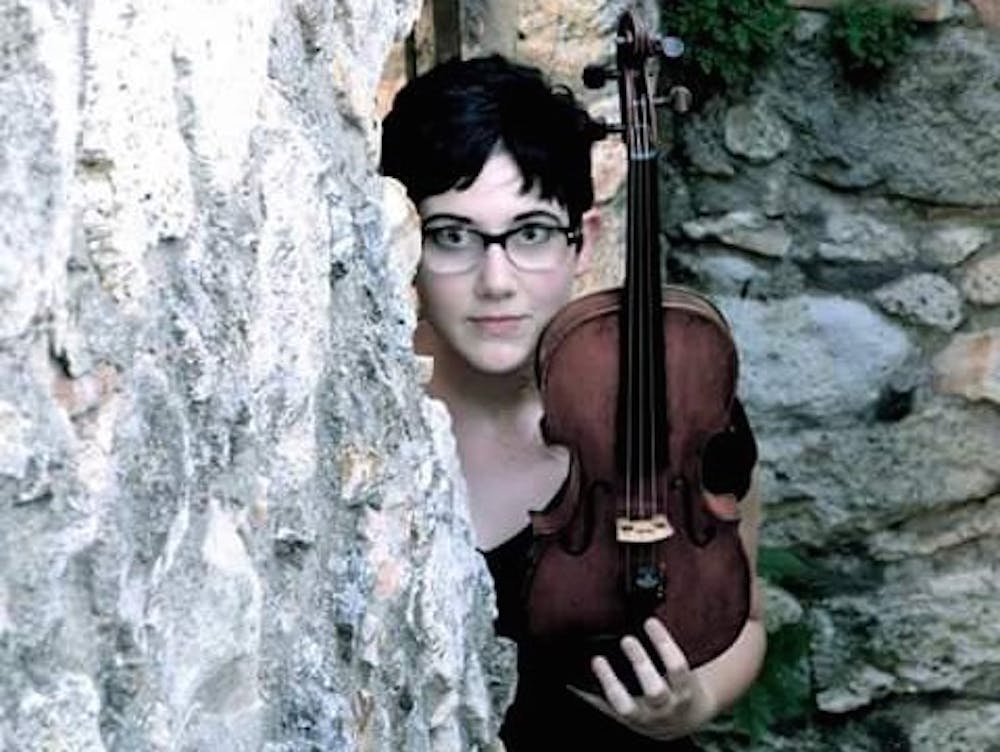The last two weeks of the semester are some of the busiest times for a college student with ever-looming finals, projects and for some, performances.
For those performing in ASU’s Doctoral Recital Series, this time can also represent an opportunity to demonstrate their passion projects and enlighten others about those passions.
Graduate student Alexandra Birch's upcoming recital this Friday will be one those opportunities to share her love of music, violin and Soviet culture.
Birch is currently pursuing a Doctor of Musical Arts in violin performance and is set to graduate in fall 2017. However, she said she has been studying the violin for much longer.
“My mom started me when I was 2,” Birch said. “It was just kind of a discipline thing she always encouraged. She wanted me to have something excellent besides academics that I did growing up. It was always just expected in our family.”
After decades of practicing and studying, Birch received her bachelor’s degree in violin performance from ASU in 2014 and her master's degree in the same field in 2015.
“My academics have always been a priority,” she said. “I’m probably going to do another academic degree following my doctoral in violin. I’m going to do one in history.”
On top of her performing and studies, Birch also teaches violin and viola at a private studio in the Phoenix area. Currently she is teaching about 20 students.
Senior biochemistry major Arianne Zaiyani is one of those students and is a good friend of Birch. She is currently taught the violin by Birch and says that the way she has been taught has actually influenced the way she learns in her other subjects.
“The first full concerto I was supposed to learn, I just went about trying to memorize every note and the rhythm and everything, but then when (Birch) heard me play, she told me, ‘No, no, no, that’s not the way to go about it,” Zaiyani said. “She taught me to be methodical about it. Slow and steady wins the race; that it’s better to go in depth and do it properly than rush through. I think that’s one of her biggest strengths really.”
When she isn’t teaching or performing, Birch said she enjoys traveling and studying the way culture, and more specifically music, impacts people.
Throughout all three of her degrees, Birch toured internationally. Birch traveled to Russia, Taiwan and all over Europe to do a few concerts, master's classes, speak and teach.
“Recently I’ve been doing a lot with the history side of things, working with undiscovered composers from genocide,” she said. “So I’ve been all over Poland and Ukraine working with composers from the Holocaust. That’s the kind of path my career is taking me now with cultural ambassadorship.”
This is a theme that will come up during her recital on Friday.
Birch said that there is something powerful about being able to play music from other cultures that aren’t as recognized and that performing them in this way reaches people in a way other forms can’t. It also allows her to play music that has meaning to her and to the world.
“I’m interested in culture as a tool for genocide commemoration,” she said. “(For example,) how powerful it can be to perform an Armenian composer’s work. ... If we’re talking specifically about Armenia, that’s a genocide that the U.S. government’s never acknowledged. So there's something that is very powerful about being able to play that music. Music can cross a boundary that politics maybe can’t touch right now.”
Some of the songs that she will perform along with pianist Michael Lewis are Myaskovsky’s “Violin and Piano,” Denisov’s “Sonata for Solo Violin,” and Gubaidulina’s “Dancer on a Tightrope,” for which she will write her dissertation on. "Dancer on a Tightrope" is described by the composer of the piece as a balance between life and death and has multiple layers to it, Birch said.
This performance will mark the second of three degree recitals she must perform in order to earn her doctoral degree.
Birch's mother, Jodie Birch, said that watching her daughter perform is something she has always loved and that because she is such a worldly person, it makes the performances that much more enjoyable.
"It's like going to a concert of some musician that I've usually gone to see live," Jodie Birch said. "I love the way they bring a passion and a uniqueness to it. I feel the same way only more intensely when I see Alexandra because I am in awe that she has this talent and this commitment, intensity and passion about her music. It's like a super special treat to me. I just can't believe she's my daughter."
Alexandra Birch said the recital will be a way for her to demonstrate how she believes music can open a dialogue about difficult topics, which she said is one of her passions and interests.
“Movies, music, visual arts; these are things that are a little bit closer to the soul of people than just talking about politics more broadly,” she said. “I think that that can be a really good way of addressing political situations, but in a way that you are getting to the soul of what people are actually interested in.”
Birch’s recital will be held Friday, Dec. 2 at 5 p.m. at the Recital Hall on Tempe Campus. Attendance is free and open to the public.
For more information on this and other student music events, click here.
Reach the reporter at balnero13@gmail.com or follow @BaldnerOwen on Twitter.
Like The State Press on Facebook and follow @statepress on Twitter.




